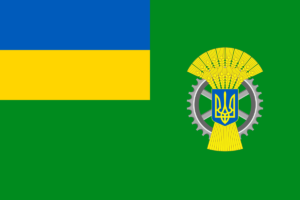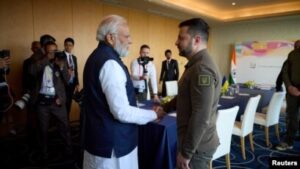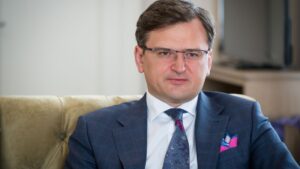
On July 23, 2024, Ambassador Extraordinary and Plenipotentiary of the Arab Republic of Egypt to Ukraine Ayman Elgammal held a diplomatic reception on the occasion of the 72nd anniversary of the Revolution of July 23, 1952.
On July 23, Egypt celebrates a public holiday – the Day of the Revolution of 1952, which resulted in the overthrow of the feudal monarchical regime of King Farouk and the establishment of a republic.
In 1953, Egypt was proclaimed a republic. Since 1971, the official name of the country is the Arab Republic of Egypt.
The solemn event on the occasion of the holiday was attended by honored guests: heads of diplomatic missions of foreign countries accredited in Ukraine, representatives of the leadership of state authorities, including Special Representative of Ukraine for the Middle East and Africa Maksym Subkh, Islamic religious figures, members of the Egyptian diaspora, educators and cultural figures.
At the beginning of his speech, Ambassador of Egypt to Ukraine Ayman Elgammal congratulated all those present on an important date in the history of the Arab Republic of Egypt, highlighted the main stages of Egypt’s formation as a sovereign country and economic achievements over the past 10 years – during the revolution that took place on June 30, 2013 and the establishment of the third Egyptian Republic in 2014.
In his speech, Mr. Ambassador emphasized that our countries have established close friendly relations in political, economic, commercial and investment spheres.
“The trade balance between Egypt and Ukraine before the coronavirus pandemic and the current war was $2.1 billion, and in 2023 it amounted to about $1.3 billion. Egypt is still the main trading partner for Ukraine in Africa and the Middle East and the seventh trading partner in the world, and the beginning of this year shows progress in returning the trade balance to pre-war levels,” the diplomat said.
He also emphasized that Egypt and Ukraine have a long history of cooperation in the space sector, and the first Egyptian satellite was designed and built in Ukraine with the participation of Egyptian experts.

In his speech, the Head of the Diplomatic Mission elaborated on the recent history of Egypt after the 1952 revolution, when his country witnessed the wars of 1956, 1967 and 1973, where more than 30% of the country, namely the Sinai Peninsula, was occupied for 6 years and, like Ukraine, underwent severe trials.
However, Egypt managed to liberate all of its lands not only through military force, but mainly through diplomacy, applying to the International Court of Justice to return the last disputed territory, the Egyptian city of Taba, even 16 years after the end of hostilities in 1973.
Drawing on this page of history, the Ambassador emphasized his country’s unwavering position in support of Ukraine’s territorial integrity and sovereignty, as these principles have defined Egypt’s position on all conflicts, including Ukraine, since 2014.

“In addition, Egypt believes that no conflict can be resolved by military means alone, as diplomacy plays a primary role in resolving any conflict, so we participated in the Arab Ministerial Liaison Committee on the Ukrainian Crisis, which was established by the Arab League and at the initiative of African presidents after the outbreak of full-scale armed aggression against Ukraine. During the OAS Summit27 , President Al-Sisi called on world leaders to work toward a peaceful resolution of the war in Ukraine. In addition, Egypt supports all efforts of the parties to resolve the conflict peacefully,” the diplomat said.
On behalf of the Ukrainian government, the Special Representative of Ukraine for the Middle East and Africa, Ukrainian diplomat and historian Maksym Subkh expressed congratulations on the occasion.

Ukraine has issued the first two licenses for the production of alcohol distillates and spirits to small producers from Odessa and Kiev regions, the press service of the Ministry of Agrarian Policy and Food has reported.
The Ministry reminded that small entrepreneurs were given the opportunity to license production after the government adopted a resolution simplifying the obtaining of production licenses. For example, small producers have received the right to submit, instead of a production certificate, a declaration of compliance of the material and technical base of small distillate production with the requirements of the legislation, registered by the State Service of Ukraine on food safety and protection (Gospotrebsluzhba).
“Prior to the adoption of regulations, the craft spirits segment in Ukraine was absent or operated in the shadows due to the complex regulatory framework. Now producers have the opportunity to create their own business and process agricultural products into value-added products that will be in demand in domestic and foreign markets,” the report says.
In addition, the current legislation provides grounds for the development of drinks with special qualities and characteristics, which can be registered as geographical indications and become a visiting card of Ukraine, to stimulate the development of gastrotourism.
Continuation of small business development in the sphere of alcoholic beverages production is the Law “On State Regulation of Production and Circulation of Ethyl Alcohol, Alcohol Distillates, Bioethanol, Alcoholic Beverages, Tobacco Products, Tobacco Raw Materials, Liquids Used in Electronic Systems” recently signed by the President of Ukraine. The document, in particular, provides for simplification of regulation of the activities of small wineries, small producers of distillates and small producers of beer, drew attention in the Ministry of Agrarian Policy.

Indian Prime Minister Narendra Modi is expected to pay a historic visit to Ukraine in a few weeks, according to Sidhant Sibal, chief diplomatic correspondent for the Indian publishing house WION, citing his own sources in New Delhi. This visit, which is currently being prepared, is tentatively scheduled for the third week of August, probably on the 23rd.
Earlier this year, Ukrainian President Volodymyr Zelenskyy personally invited the Indian leader to visit the country during a phone conversation. Since then, the two countries have been holding active high-level talks. Indian Foreign Minister Subramanyam Jaishankar and his Ukrainian counterpart Dmytro Kuleba discussed bilateral relations. National security advisors from both countries, Ajit Doval from India and Andriy Yermak from Ukraine, also held talks.
In June, Prime Minister Modi met with President Zelenskyy on the sidelines of the G7 summit in Italy. Discussing the current situation in Ukraine, the Indian leader emphasized the need for dialogue and diplomacy, stressing that India is ready to support a peaceful resolution of the conflict.
This visit will be the first personal contact between the two leaders since the beginning of the war, outside the format of the G7 summits. Prime Minister Modi may travel to Ukraine via Poland, and is likely to hold talks with the Polish leadership before traveling to Kyiv.
Prime Minister Modi’s visit to Ukraine comes almost two months after he traveled to Russia for the annual Russian summit, during which the war in Ukraine was also discussed. During his talks with Putin, Prime Minister Modi expressed regret over the deaths of innocent people and children at the Okhmatdyt hospital.

The US Mercury Bank has amended its policy, according to which it refuses to service accounts of legal entities whose founders are located in Ukraine, according to a message released by Mercury on social networks.
“While Ukraine is not subject to comprehensive sanctions, several regions of Ukraine have been sanctioned. We have previously utilized a regional model to support as many customers in Ukraine as possible; however, maintaining this policy while meeting our strict compliance standards has become increasingly challenging. We will continue to review this policy and hope to be able to modify it in the future,” the bank said in a statement to a client inquiry.
In Mercury clarified that the initial message that the bank refuses to serve and companies with founders with Ukrainian passport residing in the U.S., was erroneous.
On July 22, Petcube CEO Yaroslav Azhnyuk reported about the receipt of such a letter refusing to open accounts for applicants with passports of such countries as Belarus, Cuba, Iran, North Korea, Russia, Syria, Ukraine, Venezuela, regardless of their physical location. According to him, Ukrainian customers will have full access to their accounts until August 6, and already on August 13 their accounts will be closed.
However, in comments to the post, users published a screenshot of Mercury’s response on Linkedin, where the bank points out an error in its own statement, and says that these restrictions do not apply to Ukrainians living in the United States.
“We have always allowed (and continue to allow) customers with Ukrainian passports based in the US to use Mercury – we simply cannot support companies with founders based in Ukraine today. We apologize for the confusion caused by this error”, – stated in the message.
In turn, the Ukrainian ambassador to the United States, Oksana Markarova, reacted to the situation by asking to forward to her Mercury Bank’s letters to Ukrainian clients with permission to explain the situation.

Ukrainian Foreign Minister Dmytro Kuleba is making the first visit by a Ukrainian official to China since the beginning of Russia’s full-scale aggression against Ukraine.
“Hello to all from China. Following up on the contacts between the leaders of Ukraine Volodymyr Zelensky and China’s Xi Jinping, I am carrying out the first visit of a Ukrainian official to China since the beginning of Russia’s full-scale aggression against Ukraine. This is also the first bilateral visit of the Ukrainian foreign minister to China since 2012,” he said on his Instagram.
He informed that ahead – detailed, substantive talks with his Chinese counterpart Wang Yi on ways to a just peace.
“Must avoid competition of peace plans. It is very important that Kiev and Beijing have a direct dialog and exchange of positions. We will also discuss bilateral relations. I am convinced: after Ukraine started negotiations on accession to the European Union, China should look at relations with our state through the prism of its strategic relations with Europe,” – said Kuleba.
As reported, July 23-25, Kuleba will pay a visit to China at the invitation of Chinese Foreign Minister Wang Yi.

Ukrainian enterprises, according to the customs authorities, in January-June this year reduced imports of lead and lead products by 3.9% – to $560 thousand (in June – $137 thousand).
Exports of lead and lead products decreased by 30.8% over the reporting period – to $5.404 million (in June – $1.070 million),
The main use of lead is in the production of lead-acid batteries for the automotive industry. In addition, lead is used to make bullets and some alloys.